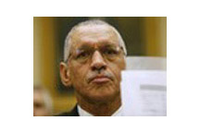Report from Washington, D.C.
Report from Washington, D.C.
Written by: developer
 Early last month, President Barack Obama released his proposed $3.8 trillion budget for the 2011 fiscal year, which gives NASA a proposed boost of $1.3 billion next year and a $6 billion increase over the next five years. To see the budget proposal, click here. The President’s plan zeroes out funding for the Constellation Program in 2011 and instead invests in commercial ventures to ferry crew to and from the International Space Station (ISS). The proposed budget directs more funds toward a robust Earth science research program and shifts the human exploration program towards more research and development initiatives. The increase in NASA’s budget came as a welcomed surprise to many who understand the country is under tight economic constraints, but the cancellation of Constellation program with few details in the budget about NASA’s overall future direction, created a furor in Washington and across the country. The proposed budget also provides funds to extend the life of the ISS to at least 2020, a move that many - international partners, in particular - have lauded. To see Space Foundation Chief Executive Officer Elliot Pulham’s critical take on the Obama proposal, click here. The budget requires Congressional approval – and a significant fight is anticipated.
Early last month, President Barack Obama released his proposed $3.8 trillion budget for the 2011 fiscal year, which gives NASA a proposed boost of $1.3 billion next year and a $6 billion increase over the next five years. To see the budget proposal, click here. The President’s plan zeroes out funding for the Constellation Program in 2011 and instead invests in commercial ventures to ferry crew to and from the International Space Station (ISS). The proposed budget directs more funds toward a robust Earth science research program and shifts the human exploration program towards more research and development initiatives. The increase in NASA’s budget came as a welcomed surprise to many who understand the country is under tight economic constraints, but the cancellation of Constellation program with few details in the budget about NASA’s overall future direction, created a furor in Washington and across the country. The proposed budget also provides funds to extend the life of the ISS to at least 2020, a move that many - international partners, in particular - have lauded. To see Space Foundation Chief Executive Officer Elliot Pulham’s critical take on the Obama proposal, click here. The budget requires Congressional approval – and a significant fight is anticipated.
On Feb. 24, the President’s top science advisor and director of the Office of Science and Technology Policy, Dr. John Holdren, testified before the House Science and Technology Committee and House Appropriations Commerce, Justice, Science Subcommittee. Dr. Holdren was called to testify about the President’s $147 billion research and development budget request for 2011, but spent the bulk of the hearings answering tough questions about the proposal to cancel Constellation in favor of commercial crew transportation systems to carry astronauts into low Earth orbit (LEO). Dr. Holdren tried to assuage concerns over this proposed new direction, which he said he believes is the only way to sustain deep space exploration.
In testimony before the Senate Space and Science Subcommittee and House Science and Technology Committee on Feb. 24 and 25, NASA Administrator Charlie Bolden attempted to address concerns over the budget proposal. Many members of Congress questioned the viability of using commercial ventures, the ability to ensure the safety of astronauts, and the potential loss of NASA’s technically skilled workforce. Bolden assured Congress that he was doing all that he could to minimize the risk related to their concerns and apologized for the lack of communications and details about the proposed plan. Ultimately, because the plan contains few details, the hearings resolved little and many members of Congress said they would continue to support Constellation until the Administration convinced them otherwise. See media reactions in a related article in Space Watch and on the Space Foundation's Facebook page. Bolden is speaking at the 26th National Space Symposium.
Congress also used the month of February to address cyber security concerns and defense acquisition reform. On Feb. 23, the Senate Commerce, Science and Transportation Committee held a hearing to discuss cyber security and the next steps to protect critical infrastructure. Security experts testified that the government needs to take a more active role in securing the Internet, arguing that as businesses and governments rely more heavily on cyberspace, the prospect of a serious attack grows.
On Feb. 25, the special House Defense Acquisition Reform Panel held its twelfth hearing on defense acquisition reform since its formation in March 2009. Rep. Rob Andrews (N-NJ), who chairs the panel, said the Defense Department faces a broad problem of managing the acquisition system. He said that the committee traced many common problems back to employees, which Review of U.S. Human Spaceflight Plans Committee Chairman Norm Augustine said he believed could be addressed by prioritizing the quality over the quantity when hiring.
Pictured: NASA Administrator Charles Bolden
This article is part of Space Watch: March 2010 (Volume: 9, Issue: 3).
